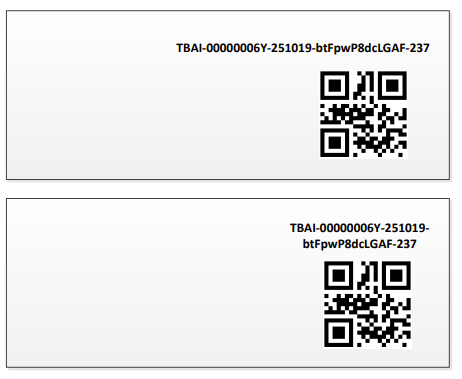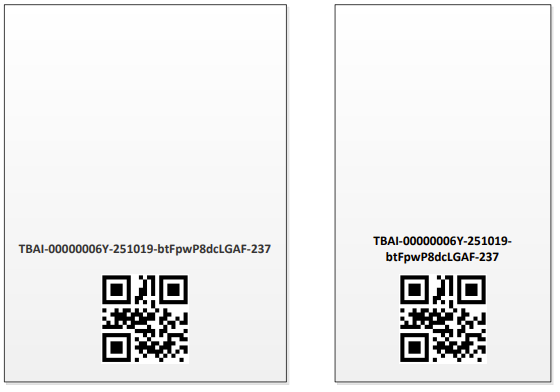Invoice Compliance
Obligation to issue invoices
According to the Spanish Legislation, businesses and professionals are required to issue invoices for the provision of services and delivery of goods they carry out, and to keep a copy of said invoice.
Invoice types
SIGN ES API supports the creation of five types of invoices:
-
Simplified Invoices: Can only be issued up to amounts of 400€ (including VAT) or up to 3.000€ in some cases (retail sales, restaurants and hospitality, parking services, among others). Does not contain information about the recipient of the invoice, only of the issuer.
-
Complete Invoices: Includes information of both the issuer and recipient of the invoice.
The legislation indicates when a simplified and a complete invoice can be issued, as well as the minimum content required for each of them.
-
Correcting Invoices: in case of errors - according to Invoicing Regulations - a correcting invoice has to be issued, indicating the type of correction carried out. There are regulations for the issuing of correcting invoices.
-
Enrichment Invoices: Can be issued when the original invoice was created without any recipients, and the only modfification required is the addition of recipient(s).
-
External Invoices: The purpose of the external invoice feature is to input details of the invoices that were issued before the integration of SIGN ES. This is to ensure corrections can be made in compliance with TicketBAI regulations. The creation of an external invoice does not trigger a submission to TicketBAI, nor does it generate an XML file for the invoice. Once an external invoice is created and a UUID is assigned, this UUID can be referenced when issuing a correcting or an enrichment invoice.
-
Remedy Invoices: Can be issued to remedy incorrect invoice information that does not require a correction by law.
-
Remedy Invoices: Can be issued to remedy incorrect invoice information that does not require a correction by law.
-
Summary (Recapitulative) Invoices: Used to replace multiple transactions carried out for the same recipient, within the timeframe indicated by the invoicing regulations. A summary invoice must use the
COMPLETEinvoice format and reference the related invoices. This is not a corrective invoice under article 15.6 of the Invoicing Regulations. More information: How to issue a Summary (Recapitulative) invoice -
Rappel (Volume-Discount) Invoices: Used to apply a volume discount on prior purchases. A rappel invoice must be issued as a
CORRECTINGinvoice that reduces the taxable base and VAT and references the original invoices. This is a correcting invoice under article 15.6 of the Invoicing Regulations. More information: How to issue a Rappel invoice?
The creation of additional documents, such as drafts, is not contemplated within SIGN ES because these documents are not involved in TicketBAI compliance. Nevertheless, the REST API could be integrated within a system that supports the generation of additional documents and files.
TicketBAI Compliance
TicketBAI legislation establishes that invoices must include an identifier code and a QR code, which have to be placed according to specific guidelines.
TicketBAI Identifier
The TBAI Identifier Code is an alphanumeric code that identifies an invoice within the TicketBAI system. It contains the TAX number (NIF) of the issuer, the expedition date and makes reference to the signature of the TicketBAI Registration file.
The generic composition of the ID or TBAI code is:
TBAI-NNNNNNNNN-DDMMAA-FFFFFFFFFFFFF-CRC
QR Code
The readable QR Code identifies the invoice and contains a URL to access the websites for the official TicketBAI invoice validation.
The size of the QR Code has to be between 30x30 millimeters and 40x40 millimeters.
Validation URL
The URL contained in the QR code is a validation URL. It allows the taxpayer to access the web application for the validation of invoices issued with a TicketBAI Software. This website is specific for each of the three provinces implementing TicketBAI, but additional parameters are contained in this URL:
-
The TicketBAI identifier code
-
Invoice series
-
Invoice number
-
Total amount of the invoice
-
Error detection code
Position
According to the orientation of the invoice, the codes have to be placed in a specific way, but always at the bottom of the document. The following images are illustrative of how the TicketBAI codes should be printed on the invoice, both for a horizontal or vertical structure.
Source: Examples extracted from Gipuzkoan TicketBAI Specifications. The images provided do not have valid size and content.

